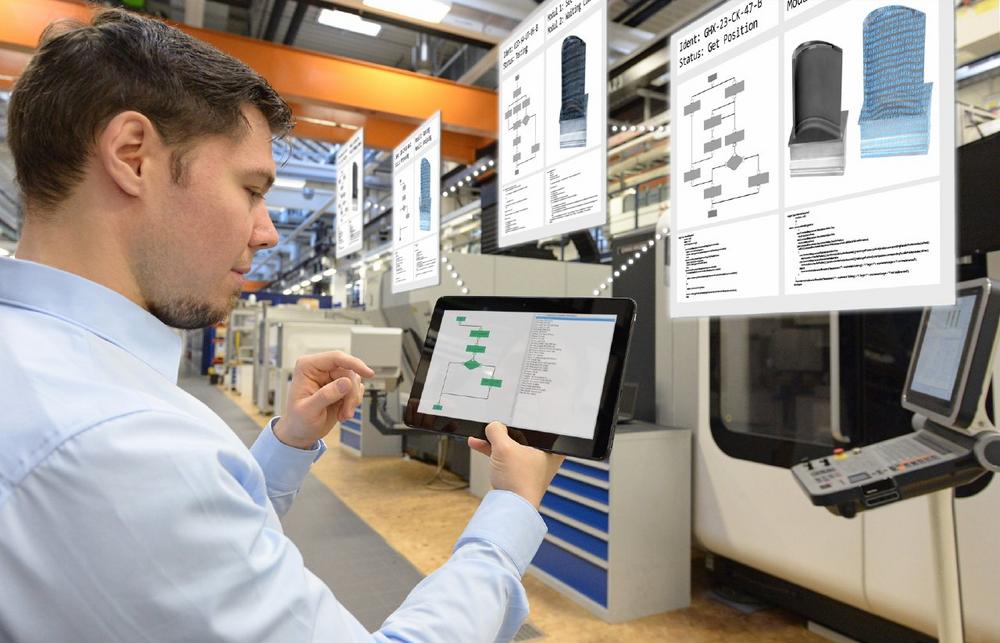The aim of the ICNAP Community is to develop new production systems and value chains as envisaged in the Industrie 4.0 concept and to test these on the basis of specific production tasks required in industrial settings. The three Fraunhofer Institutes in Aachen, for Production Technology IPT, for Laser Technology ILT, for Molecular Biology and Applied Ecology IME will collaborate with leading industrial partners such as Ericsson GmbH, MTU Aero Engines AG and Atlas Copco Airpower N.V. to ensure that this target is met. Additional ICNAP partners come from the field of measurement and sensor technology, IT, machine and plant manufacturing as well as from manufacturing companies in a range of sectors.
Three studies at the interfaces between IT and production
The “Merging data sources from different manufacturing technologies into one digital twin” study focusses on the data structures required in order to generate a digital twin in complex manufacturing environments. It is not solely about identifying which data can be recorded directly from the manufacturing machine and which require additional sensor systems. Before the data collected along the full length of the value chain can be saved and information gleaned from it, the data first have to be collated and set in relation to one another. The outcome is a digital image of the actual process which serves to visualize the process in a way that is both goal-driven and user-friendly. Recommendations for action and feedback strategies can then be derived from the information acquired about the process forms.
In the “Development of a reference architecture for 5G-enabled production” study, the partners draw up a list of the requirements which must be met prior to deploying 5G mobile data submission in production. 5G technology enables wireless sensor connections to be used in plant and machinery – thereby laying the technological foundations for real time data analysis and for adaptive control of the production processes with short reaction times. Since there are currently no standards for these applications, the ICNAP partners will establish in the course of this study, which communications protocols are suitable for use and what data transfer requirements in terms of data throughput and latency should be stipulated for each production process.
The subject of the third study is “Middleware software for the Industrial Internet of Things” in which the emphasis is on identifying the IT systems most suitable for database management and clouds for in-company and cross-company machine and plant networking. Once communication has been established within the production environment, it is vital to determine how data from various sources can be filed in a standardized form simultaneously and at a range of recording frequencies. The quality of different sources and the precision required of the data will also be defined as part of this study so that analysis results obtained within networked production can be evaluated correctly.
Hackathon in Aachen: Being part of and helping to shape Industrie 4.0
In addition to holding three workshops for the three studies, at which research results will be discussed with the partners from industry, there are plans to host a hackathon. The Institutes in Aachen hope to tap into the creative potential that exists in and around the RWTH Aachen University to inspire their development work: Gifted and talented students and graduates will have the opportunity from 28 – 30 June 2019 to demonstrate their skills, working in small teams in the Digital Church in Aachen by completing practice-based programming tasks in an actual manufacturing environment to overcome challenges presented by Industrie 4.0. Registration is now open under www.vernetzte-adaptive-produktion.de/….
ICNAP: A research platform for industry
The International Center for Networked, Adaptive Production emerged from the Fraunhofer High Performance Center “Networked Adaptive Production”, established as an initiative of the German state of Nordrhein-Westfalen and the Fraunhofer-Gesellschaft with strong support from industry at the end of 2016 in Aachen. The mission of the High-Performance Center is to launch an open research platform and test environment for industry in which new concepts for digitalized production can be researched and tested in an environment closely mirroring industrial practice by the end of the year 2019. By providing this opportunity, ICNAP supports the activities of its partners who participate in the High-Performance Center and have been offering additional interested companies the chance to take part in the three-stage model for around one year.
During the Hannover Messe 2019, the Aachen-based institutes will be presenting the approaches adopted in their studies and the ICNAP community model based on collaboration with various sectors of industry in Hall 6, Booth A30.
Das Fraunhofer-Institut für Produktionstechnologie IPT vereint langjähriges Wissen und Erfahrung aus allen Gebieten der Produktionstechnik. In den Bereichen Prozesstechnologie, Produktionsmaschinen, Produktionsqualität und Messtechnik sowie Technologiemanagement bietet das Fraunhofer IPT seinen Kunden und Projektpartnern angewandte Forschung und Entwicklung für die vernetzte, adaptive Produktion. Das Leistungsspektrum des Instituts orientiert sich an den individuellen Aufgaben und Herausforderungen innerhalb bestimmter Branchen, Technologien und Produktbereiche, darunter Automobilbau und -zulieferer, Energie, Life Sciences, Luftfahrt, Maschinen- und Anlagenbau, Optik, Präzisions- und Mikrotechnik sowie Werkzeug- und Formenbau.
Fraunhofer-Institut für Produktionstechnologie IPT
Steinbachstraße 17
52074 Aachen
Telefon: + 49 241 8904-0
Telefax: + 49 2 41 8904-198
http://www.ipt.fraunhofer.de
Presseansprechpartner
Telefon: +49 (241) 8904-180
Fax: +49 (241) 8904-6180
E-Mail: susanne.krause@ipt.fraunhofer.de
Telefon: +49 241 8904-158
E-Mail: raphael.kiesel@ipt.fraunhofer.de
